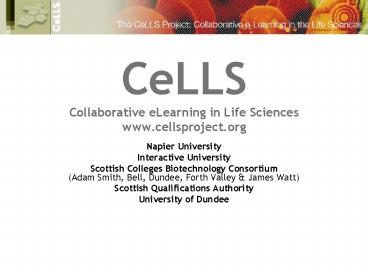CeLLS Collaborative eLearning in Life Sciences www'cellsproject'org - PowerPoint PPT Presentation
1 / 5
Title:
CeLLS Collaborative eLearning in Life Sciences www'cellsproject'org
Description:
(Adam Smith, Bell, Dundee, Forth Valley & James Watt) Scottish Qualifications Authority ... Create a set of resources for common subject areas in levels 7 and 8 ... – PowerPoint PPT presentation
Number of Views:28
Avg rating:3.0/5.0
Title: CeLLS Collaborative eLearning in Life Sciences www'cellsproject'org
1
CeLLSCollaborative eLearning in Life
Scienceswww.cellsproject.org
- Napier University
- Interactive University
- Scottish Colleges Biotechnology Consortium(Adam
Smith, Bell, Dundee, Forth Valley James Watt) - Scottish Qualifications Authority
- University of Dundee
2
eTransformation Strategy
- eTransformation
- Means different things to different Partners
- Commonality move away from lectures as the main
mode of information delivery toward a more
student centred approach (tutor supported or
independent learning). Blended learning. - Strategy
- Create a set of resources for common subject
areas in levels 7 and 8 across the consortium
(approx. 60) - Create institutional specific materials
(approx. 30)
3
Stage 1 Progress Main Products
- Curriculum Design
- Core resources identified described (v1.0)
- Learning Design Pedagogy (v0.2 draft)
- Technical
- Requirements for Metadata, QTI and SCORM 1.2
packages - Core Materials
- Authors completed Phase 1 Training
- Roles, responsibilities, workflow for
collaborative authoring defined (15 strong team) - Institutional Specific Materials POSTPONED
- Communications Dissemination
- Mostly inward-facing to inform and engage
colleagues - Evaluation
- Baseline
- Specific Staff and Student attitudes (Napier with
others to follow) - Transformation
- Early days forming an understanding of meaning
and impact for each Partner
4
Stage 1 Progress Main Outcomes
- Iterative way of working
- plan-do-review-refine
- Understanding of the inherent differences between
colleges and universities - Approach to teaching
- Breadth of student intake and social inclusion
- Institutional culture
- Building an openness for sharing materials
- Understand the difference between Quality Control
and Evaluation
5
Challenges Stage 2 and beyond
- Deliver
- 1. Curriculum Design Process Capture
- 2. Technical - Development
- 3. Core Material Authoring Development
- Begin
- 4. Institutional Specific Materials
- Strengthen
- 5. Communications Dissemination
- 6. Evaluation
- 7. Transformation































